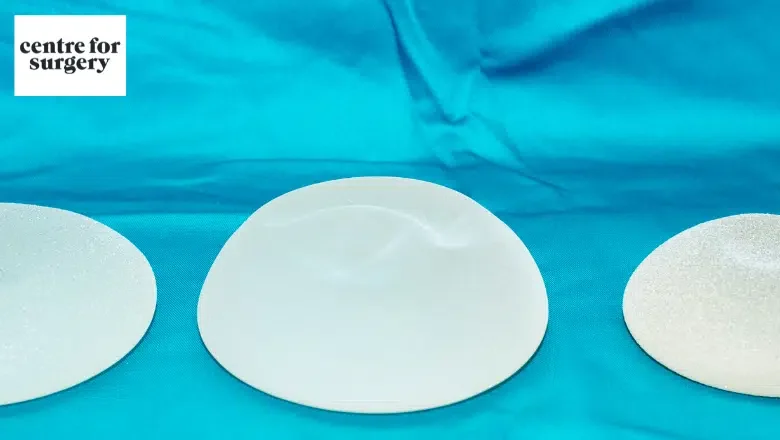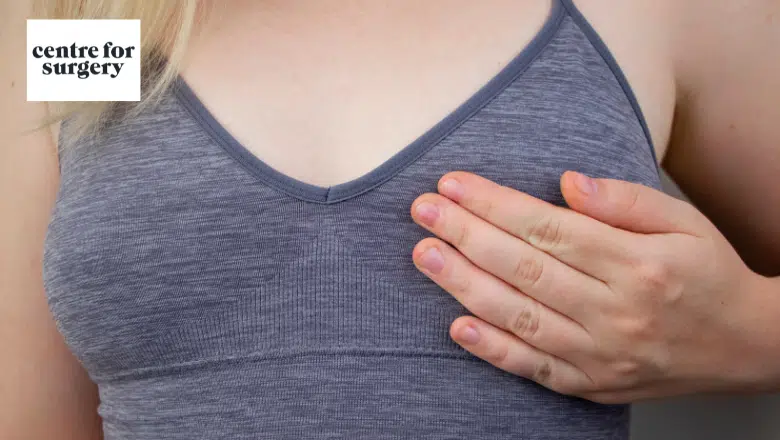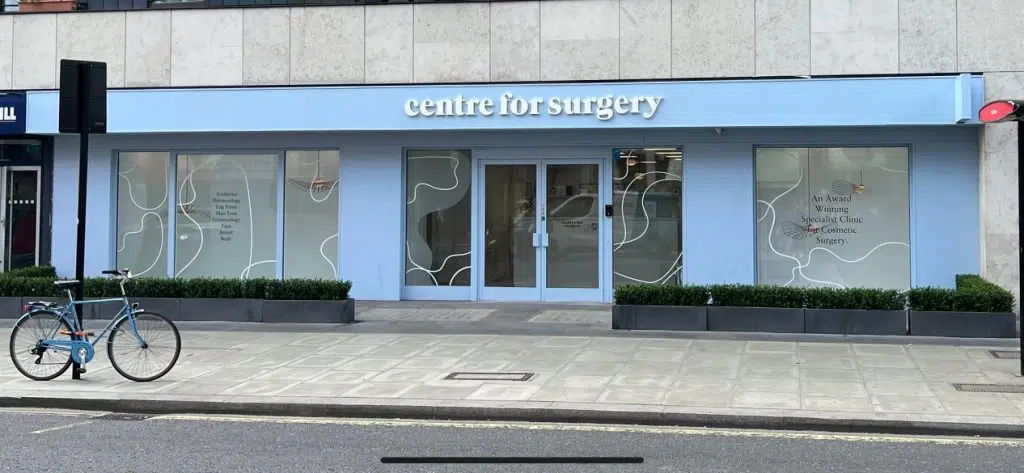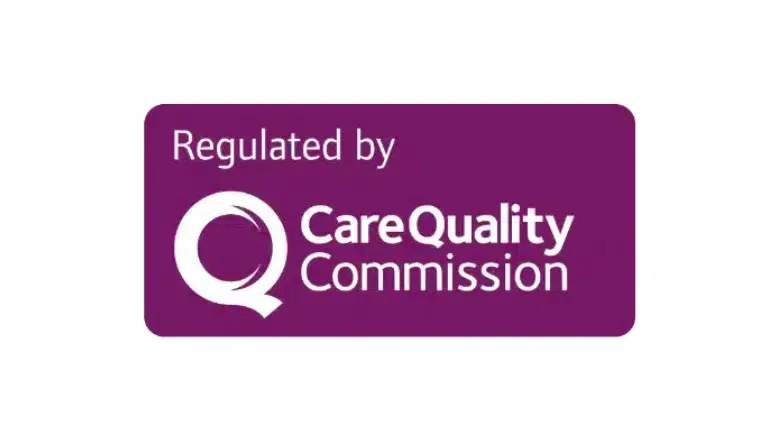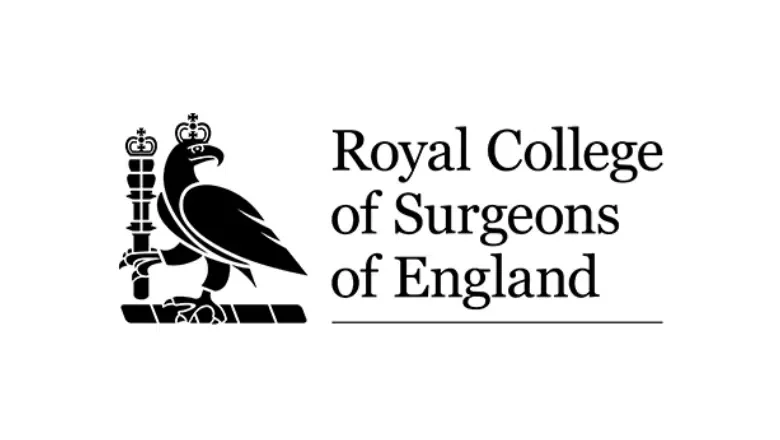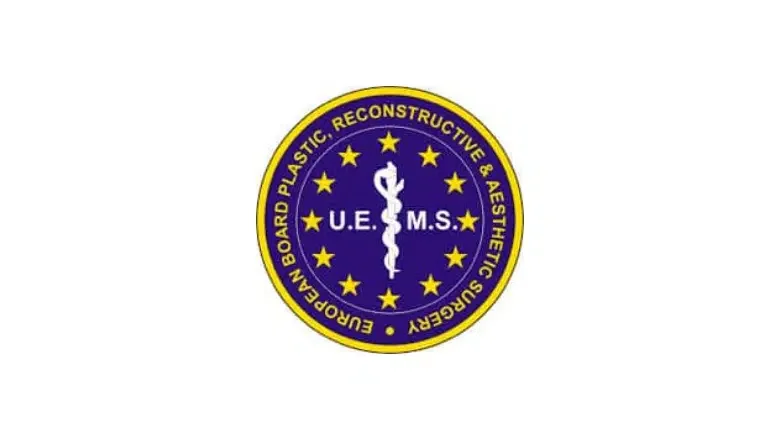Breast Implant Removal in London
Are you worried about the condition of your breast implants, or have you experienced changes in your lifestyle that have led you to consider their removal? It’s important to remember that while breast implants are designed to be durable, they are not meant to last forever. As a result, there may come a time when you need to bid them farewell.
There are several reasons why a patient may require breast implant removal surgery, including complications like malrotation, capsular contracture, or implant rupture. Some patients may also experience discomfort or have concerns about their implants, while others wish to have them removed due to lifestyle changes. Whatever the reason, breast implant removal surgery can be a safe and effective solution.
At Centre for Surgery, a leading plastic surgery clinic in London, our experienced surgeons can offer you a personalised surgical plan tailored to your specific needs. In addition to implant removal, we also offer breast lift and fat transfer procedures to rejuvenate your breasts and restore their perkiness. Our team is dedicated to helping you achieve optimal results and feel confident in your new look.
What Is Breast Implant Removal Surgery?
Breast implant removal surgery is a type of reconstructive breast surgery that requires the expertise of an experienced plastic surgeon who performs this procedure regularly. It is essential to select a surgeon who has a comprehensive understanding of breast anatomy, as well as the various techniques and options available for implant removal.
RELATED: Breast Implant Removal FAQs – Q&A about Explant Surgery
After the removal of breast implants, the breasts may appear deflated or sagging, and they may shrink or tighten over time. Therefore, many patients opt to combine their implant removal surgery with a breast lift surgery (mastopexy) or fat transfer to restore the perky and round look of their breasts.
Depending on the patient’s individual needs and desired outcomes, several techniques can be used for breast implant removal surgery. If scar tissue or capsular contracture is present, it can be removed during the procedure. This can be accomplished through a full capsulectomy or partial capsulectomy. For some patients, an en bloc removal technique may be used to remove the implant and capsule intact as one piece.
Why Are Breast Implants Removed?
Although breast implants are designed to be highly durable, they are not meant to last a lifetime. Generally, modern implants can last anywhere from 10 to 20 years without requiring replacement. However, there are several reasons why you may eventually choose to have them removed.
One of the most common reasons is the natural ageing process, which can increase the risk of complications. After 10 to 15 years, you may want to rejuvenate your breasts, lift them, and restore their perkiness, which can be affected by pregnancy or weight fluctuations. Alternatively, you may change your mind and decide that you no longer want to live with a foreign prosthesis.
Other Reasons to Get Explant Surgery
Other potential reasons for breast implant removal surgery include implant malrotation, which can cause an irregular breast shape and unevenness. Capsular contracture is another complication that can occur when scar tissue capsules form around the implants, leading to breast contraction, pain, or deformity. Breast implant rupture, which can result in misshapen breasts and pain, is another potential reason for implant removal.
Some women may also choose to have their implants removed due to fear of Breast implant-associated anaplastic large cell lymphoma (BIA-ALCL), an extremely rare cancer of the immune cells that has been associated with specific types of breast implants (most of which are now out of circulation). Additionally, some women may experience symptoms of Breast Implant Illness (BII), such as fatigue, joint pain, and other unexplained symptoms, leading them to seek explant surgery.
Regardless of your reason for wanting to have your breast implants removed, you will likely require some form of breast implant removal surgery. It’s essential to work with a skilled plastic surgeon who can assess your unique situation and develop a customised surgical plan that meets your specific needs and aesthetic goals. With the proper care and expertise, breast implant removal surgery can be a safe and effective way to achieve the results you desire.
Benefits of Implant Removal Surgery
There are several benefits to having your breast implants removed, including the following:
Easier Mammograms
Breast implants can sometimes make mammograms more difficult to perform, and in some cases, they may interfere with the accuracy of the results. By removing your implants, you can make it easier for doctors to screen for breast cancer and detect any abnormalities.
Less Breast Pain
Some women may experience breast pain or discomfort as a result of their implants. Removing them can alleviate this discomfort and improve overall breast health.
Improved Self-Confidence
Breast implants can have a significant impact on a woman’s self-image and self-confidence. By removing them, some women may experience a renewed sense of body positivity and greater self-esteem.
No More Worrying About Ruptures
Breast implant rupture is a potential complication that can occur with both saline and silicone implants. By removing your implants, you no longer have to worry about the risk of rupture or leakage.
No More Implant Replacements
Breast implants are not meant to last forever and often require replacement every 10-15 years. By removing your implants, you can avoid the need for future replacement surgeries and associated costs.
Shorter Recovery Time
Compared to breast augmentation surgery, breast implant removal surgery typically has a shorter recovery time. This means that you can return to your daily activities more quickly and with minimal disruption to your daily routine.
Are you a suitable candidate for breast implant removal surgery?
Whether or not you are a suitable candidate for breast implant removal surgery (also known as explant surgery) depends on several factors, including your health status, the reason for the surgery, and your cosmetic goals.
In general, if you are experiencing any issues with your breast implants, such as pain, discomfort, or changes in breast appearance, it’s essential to consult with a specialist plastic surgeon. They can evaluate your case, recommend the most appropriate treatment options, and help you decide whether breast implant removal surgery is right for you.
Some common reasons for explant surgery include implant rupture or leakage, capsular contracture, changes in lifestyle or health status, and concerns about breast implant-associated health issues such as Breast Implant Illness (BII) or Breast Implant-Associated Anaplastic Large Cell Lymphoma (BIA-ALCL).
How Is Breast Implant Removal Surgery Performed?
Breast implant removal, also known as explantation surgery, is typically performed under general anaesthesia at our Baker Street clinic to ensure that the patient is comfortable and pain-free throughout the procedure. The surgeon will make a small incision in the inframammary fold, which is the crease beneath the breast, to gain access to the breast implant compartment.
During the surgery, the surgeon will detach the breast implant from any surrounding soft tissue and scar tissue and carefully remove it from the breast. Depending on the patient’s individual needs and desired outcomes, the surgeon may perform any one or more of the following options:
Implant Removal with Capsulectomy
This involves removing the fibrous tissue capsule surrounding the implant, which can be particularly problematic in cases of capsular contracture or implant rupture. The surgeon may perform partial, full, or en-bloc capsulectomy – the latter of which involves removing the capsule and implant intact as one piece.
Breast Implant Removal with a Lift
Breast implant removal is almost always accompanied by breast lifting or tightening. Over time, breast implants can cause the breasts to sag, and removing them can result in a deflated or saggy appearance. The surgeon will lift the breast skin, reposition the nipple higher up on the chest, and tighten the entire breast to give it a perkier and tighter appearance. To prevent a “caved-in” deflated appearance, the surgeon may use breast reconstruction techniques to redistribute the breast tissue and create a fuller, more youthful look.
Breast Implant Replacement
In some cases, women may choose to have their breast implants removed and replaced with new implants. This can involve changing the size, shape, or type of implant used. A breast lift may also be performed to optimise the aesthetic result.
After the procedure, the surgeon will close the wound using a thin suture line to minimise scarring. If necessary, drains may be used to help remove excess fluid. With the proper care and expertise, breast implant removal surgery can be a safe and effective way to achieve the results you desire.
Recovery after Breast Implant Removal
Recovery after breast implant removal surgery will depend on the extent of the procedure and the individual patient’s healing process. However, most patients can expect to return to their normal activities within a few weeks following surgery.
Immediately after the procedure, patients may experience some soreness, swelling, and bruising. Pain medication can be prescribed to help manage any discomfort. Patients may also need to wear a compression garment or surgical bra to help support the breasts and reduce swelling.
During the first week after surgery, it is crucial to rest and refrain from any strenuous activity. Patients should also avoid lifting heavy objects or engaging in activities that may strain the chest area. Light walking is encouraged, as it can help promote blood flow and prevent blood clots.
After the first week, patients can gradually resume their daily activities, provided they do not cause any discomfort or strain in the chest area. Most patients can return to work within two weeks, depending on the nature of their job.
Ensure you attend all follow-up appointments with your plastic surgeon to ensure proper healing and monitor for any potential complications. Patients should also maintain a healthy diet and avoid smoking, as these factors can impact the healing process.
How Will My Breasts Look After Having Implants Removed?
After having breast implants removed, it’s important to understand that your breasts will look different from what they were with implants or before you had them. The size of your breasts will be smaller than when you had implants, and there may be some sagging or deflation due to the stretching of the skin from the implants.
RELATED: Will My Breasts Be Flat After Breast Implant Removal?
To address this, your plastic surgeon will typically use breast reconstruction techniques to redistribute the available breast tissue and give the breasts a fuller, more natural appearance. This may involve performing a breast lift (mastopexy) to tighten the skin and reposition the nipple to a higher position on the chest.
If you opt to have new implants inserted after the old ones are removed, your breast size does not necessarily have to be reduced unless you choose to go with smaller implants. Your plastic surgeon can help you determine the appropriate size and type of implant for your desired outcome and perform any necessary breast reconstruction techniques to achieve the best possible results.
Risks and Complications of Explant Surgery
As with any surgical procedure, breast implant removal surgery carries certain risks and potential complications. These can include:
Infection
Infection is a possible risk with any surgery, and breast implant removal is no exception. Antibiotics may be prescribed before and after the surgery to reduce the risk of infection.
Bleeding
Excessive bleeding during or after the surgery can lead to complications and may require additional procedures to address.
Changes in breast appearance
After breast implant removal, the breasts may appear deflated, saggy, or asymmetrical. These changes may be temporary or permanent, and additional procedures may be necessary to address them.
Poor scarring
Scarring is a natural part of the healing process, but some patients may experience poor scarring that can be more visible or raised than expected.
Nerve damage
During surgery, nerves in the breast tissue may be damaged, which can result in numbness or tingling sensations in the breast area.
Breast tissue loss
In rare cases, breast implant removal surgery can result in the loss of breast tissue, which can cause an uneven or distorted breast appearance.
Anaesthesia risks
General anaesthesia can carry certain risks, including allergic reactions and other complications.
Longer term results of Breast Explant Surgery
When considering the removal of breast implants, it’s essential to understand that the long-term outcomes can vary significantly from person to person. These outcomes are influenced by several factors that were present before and after the initial breast augmentation surgery. The original shape and condition of the breasts, the size of the implants, and various changes the body undergoes over time, including weight fluctuations and hormonal changes, all play a crucial role in determining the final appearance of the breasts post-explant surgery.
The size of the implants initially chosen can have a noticeable impact on the post-surgery results. Smaller implants tend to be associated with a reduced likelihood of breast sagging post-removal, compared to the larger counterparts. This is because larger implants stretch the skin and tissues more, which can lead to increased sagging once they are removed.
Body changes such as weight loss, pregnancy, weight gain, and menopause also significantly affect the breasts’ shape and elasticity. These changes, combined with the size of the original implants, make each patient’s results truly unique.
Another critical factor in the post-surgery appearance of the breasts is the condition of the skin, particularly the levels of collagen and elastin. These proteins are essential for the skin’s elasticity and firmness. Patients with higher levels of collagen and elastin are more likely to see their breasts return to a pre-augmentation appearance shortly after the explant procedure. On the other hand, those with less skin elasticity may find that their breasts do not return to their original state as easily and may require additional procedures, such as a breast lift, to achieve the desired aesthetic outcome.
Breast Implant Removal Surgery Cost London - How much does implant removal surgery cost in London UK? Prices & Fees
As every breast implant removal surgery is unique and tailored to the patient’s needs, this procedure has no fixed price. The cost will depend on several factors, including the extent of surgical correction required, the surgeon’s expertise, and any additional procedures performed in conjunction with the removal.
RELATED: How Much Does Breast Implant Removal Cost?
During your initial consultation, your plastic surgeon will conduct a thorough assessment of your breasts and discuss your goals and expectations for the procedure. Based on this information, they will provide you with a personalised quote for the cost of the surgery.
Breast implant removal cost should not be the only factor you consider when choosing a plastic surgeon. Selecting a qualified and experienced surgeon who can deliver the highest quality care and help you achieve the best possible outcomes from your breast implant removal surgery is crucial.
If you’re considering breast implant removal surgery, Centre for Surgery can provide you with an estimate of the costs involved. Their team of experts can guide you through the process and help you make an informed decision about your care.
Is breast implant removal available on the NHS?
Breast implant removal surgery is generally considered a cosmetic procedure and is not typically available on the NHS (National Health Service) in the UK. However, there may be some exceptions if the implants are causing significant health problems, such as chronic pain or infection.
In cases where the implants were initially inserted for reconstructive purposes, such as after breast cancer surgery, the NHS may cover the cost of removal if deemed medically necessary. However, each case is assessed individually, and there is no guarantee that the NHS will cover the cost of the procedure.
Why Choose Centre for Surgery for Breast Implant Removal?
If you’re considering breast implant removal surgery, choosing the right plastic surgeon and clinic is crucial for achieving the best possible outcomes. Here are some reasons why Centre for Surgery is the right choice for your breast implant removal:
Highly qualified and experienced surgeons
Centre for Surgery has a team of highly qualified and experienced plastic surgeons specialising in breast implant removal. We use the latest techniques and technologies to deliver each patient safe, effective, and personalised care.
Patient-centred approach
Centre for Surgery takes a patient-centred approach to care, which means we prioritise your individual needs, goals, and preferences throughout the entire process. We work closely with you to develop a personalised treatment plan that meets your unique needs and delivers the best possible results.
State-of-the-art facilities
Centre for Surgery is equipped with state-of-the-art facilities and technologies that are designed to provide a safe and comfortable environment for patients. Our facilities are fully accredited, ensuring the highest standards of safety and quality.
Comprehensive care
Centre for Surgery provides comprehensive care throughout the entire breast implant removal process, from the initial consultation to post-operative follow-up care. We offer a range of services to ensure that your recovery is as smooth and comfortable as possible.
Positive patient reviews
Centre for Surgery has received numerous positive patient reviews for our exceptional care and results. Many patients have reported feeling comfortable, confident, and satisfied with their experience at the clinic.
What is included in my treatment package?
- As many preoperative consultations with your surgeon as you like to make sure the procedure is right for you
- Treatment at a specialist day surgery facility recently rated ‘Good’ by the CQC
- Enhanced same-day discharge with the added benefits of recovering in your own home
- 24/7 clinical support from your surgeon for the first 48 hours and our expert postoperative support team
- Your very own dedicated patient coordinator
- In-depth preoperative medical assessment to make sure you are fully fit for your procedure
- Exceptionally high standards of postoperative care are described as ‘outstanding’ by the CQC with regular telephone and face-to-face checks.
RealSelf Top Doctors for Breast Implant Removal
RealSelf’s Top Doctor status is awarded to fewer than 10% of the RealSelf doctor community. This status is earned by consistently achieving high patient satisfaction (as rated in RealSelf reviews), receiving excellent feedback on expert answers to patient questions, and investing significant time in Q&A and other doctor-related activities. RealSelf’s top doctors are rated among the best surgeons in the UK.
FAQs
-
Can I have my breast implants removed?Yes, in most cases, you can have your breast implants removed. Breast implant removal surgery is typically performed for one of several reasons, such as a desire to remove the implants, complications from the implants, or changes in lifestyle or health status.
If you are experiencing any issues with your breast implants, such as pain, swelling, or changes in breast appearance, it's important to consult with a plastic surgeon at Centre for Surgery. We can evaluate your individual case, recommend the most appropriate treatment options, and help you decide whether breast implant removal surgery is right for you. -
When should you have breast implants removed?Breast implants are designed as long-term, but not lifelong, solutions. Generally, it's advised to consider replacement or removal of breast implants every 10 to 15 years. If you find that your implants no longer suit your body frame, particularly if they appear too large for a thinner frame, or if you're experiencing health issues directly related to the implants, it might be time to consider explant surgery. Additionally, changes in aesthetic preferences or lifestyle may also prompt the decision for removal.
-
What happens if you don't remove your breast implants?If you choose not to remove your breast implants, there are some potential risks and complications that you may face over time. Here are some of the issues that can occur if you choose to leave your breast implants in place:
Rupture: Breast implants can rupture or leak over time, which can cause pain, changes in breast appearance, or infection. Ruptures can be caused by a variety of factors, including trauma, ageing of the implant, or normal wear and tear.
Capsular contracture: Capsular contracture is a complication that can occur when scar tissue forms around the breast implant, causing the implant to harden and become misshapen. This can cause pain, discomfort, and changes in breast appearance.
Implant displacement or malposition: Over time, breast implants may shift or become misaligned, which can cause asymmetry, discomfort, or other complications.
BIA-ALCL: Breast implant-associated anaplastic large cell lymphoma (BIA-ALCL) is a rare type of cancer that can occur in individuals with breast implants. While the risk is extremely low, it's important to know the potential risks associated with breast implants.
Changes in breast appearance: As breast implants age, they may change in size, shape, or texture, which can lead to changes in breast appearance. Some women may find that their breasts become saggy or misshapen over time. -
What are the side effects of removing breast implants?After the removal of breast implants, it's common for the breasts to appear smaller, saggy, and potentially misshapen initially. This change is due to the adjustment your skin and tissue must make after the volume provided by the implant is removed. Over time, the appearance may improve as the skin retracts, though this can vary based on individual factors such as skin elasticity and the original breast size.
-
Can breast implants last 30 years or more?Breast implants are not considered to be lifetime devices, and the lifespan of an implant can vary widely depending on a variety of factors. While some breast implants may last for 30 years or more, others may need to be replaced much sooner.
Several factors can affect the longevity of breast implants, including the type of implant used (saline or silicone), the placement of the implant (above or below the muscle), the quality of the implant, and the individual patient's anatomy and lifestyle.
Most breast implants will need to be replaced at some point, usually between 10-20 years after the initial surgery. This is because the implants may start to show signs of wear and tear, such as leaks or ruptures, or because the patient's body has changed over time. -
What happens when breast implants are removed and not replaced?Removing breast implants without opting for replacement will result in the breasts returning to a smaller size, closer to the original breast size before augmentation. However, depending on how long you've had the implants and the size of the implants, there might be noticeable changes in breast shape and elasticity.
-
How do you know when breast implants need replacing?Breast implants are not designed to last forever and will need to be replaced at some point. Here are some signs that your breast implants may need to be replaced:
Changes in breast shape or size: Over time, breast implants may start to shift or move, which can cause changes in breast shape or size. If you notice any changes in the appearance of your breasts, it's important to consult with a plastic surgeon.
Pain or discomfort: Breast implants that are old or damaged may cause pain, discomfort, or other symptoms. If you are experiencing any pain or discomfort in your breasts, it's important to see a plastic surgeon to determine the cause.
Rupture or leakage: Breast implants can rupture or leak over time, which can cause changes in breast shape, pain, or infection. If you suspect that your breast implants may have ruptured or leaked, it's important to see a plastic surgeon as soon as possible.
Capsular contracture: Capsular contracture is a complication that can occur when scar tissue forms around the breast implant, causing the implant to harden and become misshapen. This can cause pain, discomfort, and changes in breast appearance.
Ageing of the implant: Breast implants will naturally age over time and may lose their shape or become less firm as they get older. If you notice any changes in the appearance or texture of your implants, it may be time to consider a replacement. -
Should I get an explant surgery?Deciding to undergo explant surgery is a personal choice that should be made based on individual needs, health considerations, and aesthetic goals. While breast implants do not have a defined expiry date, it is recommended to reassess their condition and fit every 10-15 years.
-
Why are people removing their breast implants?People choose to remove their breast implants for various reasons, with capsular contracture being among the most common. Capsular contracture involves the hardening of scar tissue around the implant, which can cause discomfort and pain. Other reasons include lifestyle changes, aesthetic preferences evolving over time, or the desire for implants that are better suited to their current body frame.
-
How long will the results last after breast implant removal?Breast implant removal gives permanent results. Patients may notice changes in the size, shape or position of the breasts as the breasts undergo the ageing process with time. Pregnancy and changes in weight can affect the result of the breast implant removal procedure.
-
Will I need a breast lift after a breast implant removal?After having the breast implant removal procedure, you may find you are dissatisfied with the shape of your breasts. A breast lift procedure is an effective procedure to change the shape of the breasts through the removal of excess skin leading to tightening of the soft tissue envelope of the breast to restore a more youthful breast contour. In many cases you may be happy with the shape of your breasts and therefore a breast lift procedure may not be required.
-
How does breast implant removal differ from breast implant replacementIn breast implant removal, the removed implant is not replaced with another implant. After breast implant removal, the skin overlying the breast will undergo a degree of skin retraction so that the breasts will appear more or less as they were before having breast implants. It is unlikely you will require any further procedure to change the appearance of the breasts, although a breast lift is ideal for those unhappy with the shape of their breasts.
In a small number of cases, it may be appropriate to perform fat grafting to the breasts to create a degree of lift, and in more severe cases of breast sagging, a surgical mastopexy or breast lift may be necessary. -
What are PIP implants and why do they need to be removed or replaced?PIP breast implants were manufactured by a French company and were made using a non-compliant type of industrial silicone instead of medical-grade silicone. There were clear dangers to the health of using such an implant. PIP implants had a much higher rate of implant rupture than approved medical-grade breast implants.
Large commercial cosmetic surgery groups heavily used PIP implants as they were very cheap. There are approximately 50000 women who had these implants in the UK.
Sadly once regulators discovered the fraudulent nature of the implants, many women very understandably wanted them removed or replaced. However, there has been no proven link to serious health conditions due to having PIP implants. Centre for Surgery is well-known for its expertise in breast implant removal and/or replacement and has treated hundreds of women affected by PIP implants. We have never used PIP implants and continue using only the highest quality approved medical grade silicone breast implants. -
What are the problems associated with PIP implants?Although implant replacement is required for implants that have reached the end of their lifespan, some breast implant removal procedures have become sadly necessary for implants made of defective materials, such as PIP implants. The larger cosmetic surgery chains used PIP implants as they were cheap and helped to cut costs and increase profits at the expense of patient safety.
Centre for Surgery has never used PIP implants and is only a handful of UK providers not to have used them. Other providers have cut corners in providing high-quality patient care, and in doing so, they have put patients' lives at risk. For patients desiring breast implant removal, we have built up a solid reputation in catering to the needs of women who commercial-focused cosmetic surgery groups have badly let down. If you have been experiencing symptoms from your breast implants and suspect them to be lower-grade PIP implants, we advise you to get in touch to learn about the available treatment options.
For all our patients who have had breast implant surgery at Centre for Surgery, you can be reassured that the implants which our surgeons are only of the highest quality and have undergone rigorous safety testing. -
Does breast implant removal have to be performed by the same surgeon who performed my breast augmentation?No. In a number of cases, the surgeon who performed the original breast augmentation procedure may have moved to another area or retired. Having the breast implants removed by another highly qualified plastic surgeon is perfectly acceptable. Our surgeons have many years of performing revision breast surgery on patients who have had their first procedure performed elsewhere.
-
What is capsular contracture ?Breast implants are made of silicone and are classified as a foreign material. Foreign materials do not occur naturally in the human body. Foreign objects such as breast implants, when inserted into the human body, lead to the formation of a tissue capsule that is fibrous in nature. This occurs with any implant, not just breast implants and is a normal phenomenon.
Different people will have a slightly different manners in how this fibrous tissue capsule forms. Some people are more prone to developing thicker scar tissue, and in this case, the surrounding tissue capsule around the implant will be harder in consistency. With the muscular contraction of the pectoralis muscle, this dense fibrous capsule can contract around the implant. This process is referred to as capsular contracture and can cause the breast implant to appear deformed with more severe degrees of capsular contracture. Often in more marked cases of capsular contracture, the patient may experience discomfort.
Breast implant removal is often performed alongside surgery for capsular contracture. The two surgical options for capsules are capsulotomy, a quick and straightforward procedure to perform, and a more involved procedure called a capsulectomy, which involves the removal of the entire capsule. -
How do I prepare for an explant surgery?Preparation for explant surgery involves several steps to ensure the best possible outcome:
Undergo necessary lab testing and medical evaluations.
Cease smoking and drinking alcohol a few weeks before the surgery, as these can affect recovery.
Avoid blood-thinning medications as per your surgeon's advice to reduce the risk of bleeding.
Adjust your current medications according to your surgeon's recommendations.
Plan for a recovery period by taking time off work and arranging for assistance, such as someone to drive you home post-surgery. -
What does the breast implant removal procedure involve?The surgeon will make an incision where your old incision was made. The implant will then be removed, and the incision will be closed with dissolvable sutures.
Breast implant removal is a straightforward procedure to carry out. Most breast implants can be removed without difficulty and can even be performed under local anaesthetic. Polytech implants made of polyurethane may be more complex to remove, and the procedure is more complex for these types of implants. -
Where can I get breast implant removal?All breast implant removal procedures are performed at our state-of-the-art medical facility at 95-97 Baker Street in Marylebone, central London.
All our plastic surgeons are highly trained in all aspects of aesthetic breast surgery, including explant of breast implants. -
How long does breast implant removal take to perform?Breast implant removal takes no more than 45 minutes to carry out, and in most cases, less than 30 minutes is normal. For patients who require a capsulectomy, the procedure time can be more than 2 hours.
-
What type of anaesthetic is used for breast implant removal?Breast implant removal is performed under TIVA general anaesthetic. This means you will be asleep for the duration of the procedure.
-
Can I have breast implant removal as a day case procedure?Yes. Breast implant removal is routinely carried out as a day case procedure under either local anaesthetic for simple cases or a short general anaesthetic where a capsulectomy is also required.
You will be able to return home once the effects of the anaesthetic have worn off and you are deemed medically fit for discharge. -
What happens when you remove breast implants?Immediately following the removal of breast implants, the breasts may appear deflated, especially if not replacing the implants. This initial appearance gradually changes as the tissue adjusts. Discussing all available options with your plastic surgeon before the procedure is crucial to set realistic expectations for the post-surgery appearance.
-
What does recovery involve after explant surgery?The recovery following breast implant removal will generally be easier and smoother than the one experienced after your initial breast augmentation. However, the recovery period may be longer if you also had a breast uplift after your implant removal.
After the surgery, it is normal to experience some swelling, redness and bruising. You may need to take pain medication to help with any symptoms.
You will have a compression garment which you will need to wear throughout the recovery period. This will help to support the breasts and reduce any swelling.
You may need to take up to five days off work. This will vary from person to person. You may need to take more time off if you have a physically demanding job. Those who had capsular contracture may also need to take extra time off.
You must avoid strenuous physical exercise, including any heavy lifting, for at least six weeks. This will also include lifting young children. If you have young children, you may have to consider childcare options for your recovery period.
Your breasts may take at least two months to settle into place. Your breasts may initially appear deflated, but volume will eventually be restored. -
Will I have a scar after breast implant removal?Yes, it's likely that you will have some scarring after breast implant removal surgery. The exact amount of scarring will depend on the type of procedure you have, the size and location of your implants, and your individual healing process.
Breast implant removal surgery typically involves making incisions in the breast tissue to access and remove the implants. These incisions will leave scars, which will gradually fade over time but may never completely disappear.
However, the amount of scarring can be minimised by choosing an experienced and skilled plastic surgeon who can carefully place the incisions in inconspicuous areas and use advanced surgical techniques to minimise tissue damage and promote faster healing. -
Will I have to wear a surgical bra after removal of breast implants?Following surgery, you will need to wear a compression garment. This will help to support your breasts and to reduce any swelling.
-
How long will I have to take off work after explant of breast implants?You will need to take at least five days off work. You may need to take longer if you have a physically demanding job.
-
How long will I need to avoid exercise after breast implant removal?You will need to avoid any strenuous physical exercise, as well as heavy lifting, for at least six weeks.
-
When will I be able to see results from breast implant removal?You can expect to see results immediately after the breast implant removal procedure. The appearance will continue to improve over a number of weeks after the procedure during the healing process. If you are unhappy with the final shape of your breasts after breast implant removal, your surgeon may recommend a breast lift with or without breast implants to improve the appearance of the breasts.



